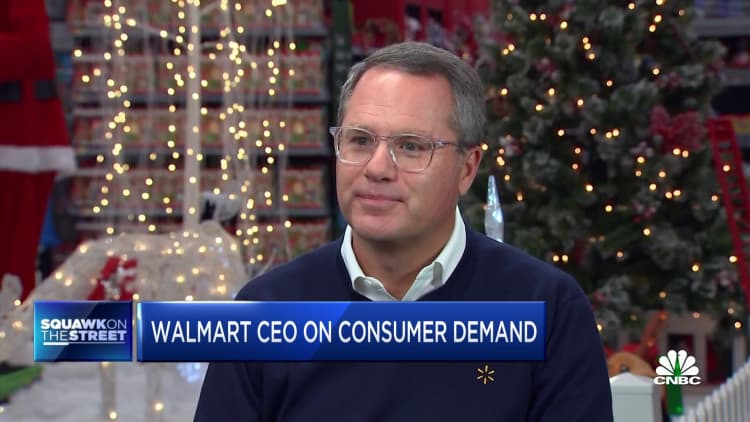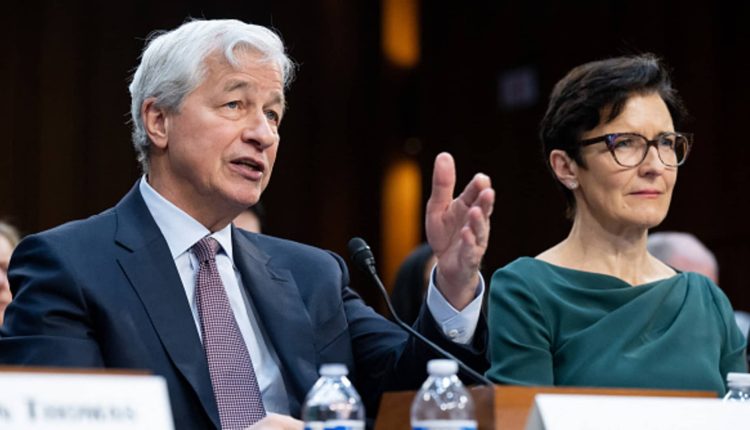Here are the most important news items that investors need to start their trading day:
1. Snoozing and losing
Make that three straight losing days for the Dow and the S&P 500. Granted, the declines Wednesday were tiny, but stocks are stuck in a little rut after the big November rally. The Nasdaq also slid a little Wednesday. Investors are picking over the latest jobs data, which has indicated some cooling off in the economy – and lifted hopes that the Federal Reserve may cut its benchmark rate last year. On Wednesday, private payrolls data came in lower than expected. Thursday brings weekly jobless claims, and Friday the market will be locked in on the November nonfarm payrolls report. Follow live market updates.
2. Oil slips
An aerial view of a crude oil storage facility is seen on May 4, 2020 in Cushing, Oklahoma.
Johannes Eisele | Afp | Getty Images
Stocks aren’t the only asset sliding of late. West Texas intermediate crude oil fell 4% Wednesday to under $70 a barrel, the lowest level since late June. The declines come even as the oil-producing countries of OPEC+ suggest that they will continue or perhaps deepen production cuts. In turn, gasoline prices have continued to decline, as well, falling to their lowest point since January. That should give some relief to Americans as they shop for the holidays and gear up for travel later this month.
3. Wall Street invokes Main Street
JPMorgan Chase Chairman and CEO Jamie Dimon (L) and Citigroup CEO Jane Fraser testify during a Wall Street oversight hearing by the Senate Banking, Housing, and Urban Affairs committee on Capitol Hill in Washington, DC, December 6, 2023.
Saul Loeb | Afp | Getty Images
The CEOs of Wall Street’s biggest banks on Wednesday took their fight against proposed new capital rules to Capitol Hill. And they leaned on Main Street to make their case. JPMorgan CEO Jamie Dimon argued to the Senate Banking Committee that the rules, known as the Basel 3 endgame, would make mortgages and small-business loans more expensive, while Citigroup CEO Jane Fraser evoked the heartland by saying the regulations would make things harder for farmers looking for financing. Majority Democrats weren’t having it, though. “You’re going to say that cracking down on Wall Street is going to hurt working families, you’re really going to claim that?” said Sen. Sherrod Brown, the Ohio Democrat who chairs the panel.
4. AbbVie’s new deal
Test tubes are seen in front of a displayed AbbVie logo in this illustration taken on May 21, 2021.
Dado Ruvic | Reuters
AbbVie landed its second big deal in as many weeks Tuesday, when it announced it agreed to buy Cerevel Therapeutics for about $8.7 billion. Just last week, the pharmaceutical giant struck a deal to buy cancer treatment developer Immunogen for nearly $10 billion. The deals come as AbbVie works to expand its drug pipeline with treatments such as its Humira arthritis medication facing competition from generic drugs, as CNBC’s Annika Kim Constantino points out. Cerevel would bolster AbbVie’s psychiatric and neurological treatment portfolio. Cerevel also has an experimental drug intended to treat Alzheimer’s disease psychosis and schizophrenia. The deal is expected to close in the middle of next year.
5. The consumer question

Shoppers are faring better these days than expected as they head to malls and big box retailers to shop for holiday gifts, according to Walmart CEO Doug McMillon. What happens in 2024, though, is up in the air. “If we had been talking last spring or at the beginning of last year, I expected more softness by this time of the year than we’re actually experiencing,” he told CNBC’s Sara Eisen in an interview, while adding that “next year’s a different story.” While the retailer is seeing deflation in some pockets, it’s no guarantee that people will keep buying, especially with higher credit card rates crimping budgets. Walmart will also have to hustle to sell more products to make up for a loss of pricing power. Still, McMillon said, “we’d rather have lower prices than higher prices.” Spoken like a true discounter.
– CNBC’s Pia Singh, Spencer Kimball, Hugh Son, Annika Kim Constantino, Melissa Repko and Sara Eisen contributed to this report.
— Follow broader market action like a pro on CNBC Pro.
Read the full article here

